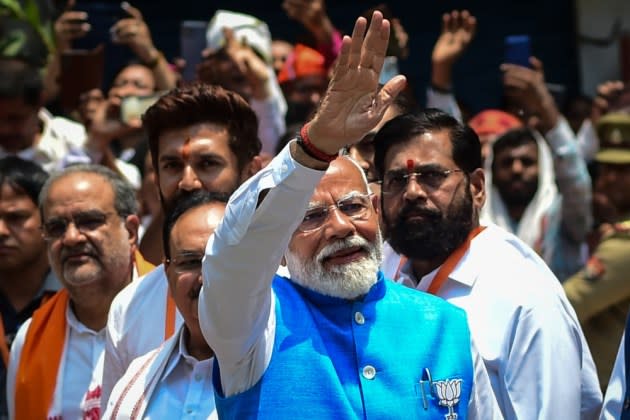Narendra Modi Proclaims Victory in India’s General Election as Opposition Alliance Makes Massive Gains

In the end it was not quite the landslide mandate that incumbent Prime Minister Narendra Modi and his Hindu nationalist Bharatiya Janata Party (BJP) had anticipated or that exit polls had predicted. However, by Wednesday morning it was clear that Modi remains the dominant force in Indian politics and had won an historic third term as the country’s Prime Minister.
Far from the pre-election sloganeering that predicted 400 seats out of 543 in India’s lower house of parliament, the Lok Sabha, the BJP-led National Democratic Alliance (NDA) managed 294 – more than the 272 required to form the next government. The number was significantly lower than the 353 the alliance secured in the 2019 general election.
More from Variety
Roy Kapur Films Sets Biopic on India's First Chief Election Commissioner Sukumar Sen (EXCLUSIVE)
India Vies for Global Production Hub Status With Attractive Filming Incentives
India, Papua New Guinea Co-Production 'Papa Buka' Sets July Shoot - Global Bulletin
The BJP lost its outright 2019 majority of 303 seats and saw its lead reduced to 24. in 2024. To form the next government and rule for a third consecutive term, it will need the support of its electoral allies. At 6am local time on Wednesday (June 5), the Election Commission was reporting 240 seats for Modi’s BJP, 12 for its ally the JD and 16 for the TDP.
The Indian National Congress-led opposition on the other hand made massive gains compared to 2019. Then called the United Progressive Alliance, the opposition had secured 91 seats, including 52 for the Congress. In 2024, the Indian National Developmental Inclusive Alliance (INDIA) won 231 seats, which included 99 for the Congress.
People have placed their faith in NDA, for a third consecutive time! This is a historical feat in India’s history.
I bow to the Janata Janardan for this affection and assure them that we will continue the good work done in the last decade to keep fulfilling the aspirations of…— Narendra Modi (@narendramodi) June 4, 2024
Proclaiming victory, Modi posted: “People have placed their faith in NDA, for a third consecutive time! This is a historical feat in India’s history. I bow to the Janata Janardan [the electorate] for this affection and assure them that we will continue the good work done in the last decade to keep fulfilling the aspirations of people.”
The BJP returned to power on a manifesto that extolled its governance and economic progress since the Modi wave that began in 2014 and continued in the 2019 general election. India’s economy is now the fastest growing of any major country and there have been infrastructure and organizational improvements. At the same time though, there are growing disparities between rich and poor, and India’s total GDP remains about one sixth of that of neighbor and rival China.
India’s stock markets reacted negatively, with the Sensex and Nifty 50 indices each falling nearly 6% on Tuesday, in reaction to the denting of Modi’s aura of invincibility and the possible impact on economic decision making. Investment analysts warned of a period of stock market volatility while political horse-trading was ongoing.
From an entertainment industry perspective, the BJP government’s biggest achievement was its 2022 implementation of a 30% reimbursement scheme for international productions shooting in India. This went up to 40% in 2023 and the cap limit for the reimbursement was also significantly raised from a maximum of $300,000 to $3.5 million, with an additional 5% rebate bonus for significant Indian content.
The BJP’s 2024 manifesto did not directly address the media. Instead, it promised several actions that would indirectly help the film and media industry, including further infrastructure and transport improvements and innovation in AI.
The Congress manifesto on the other hand did address the media directly, promising to amend the Press Council of India Act, 1978 “to strengthen the system of self-regulation, protect journalistic freedoms, uphold editorial independence and guard against government interference.” The Congress also said it would pass a law to curb monopolies in the media, cross-ownership of different segments of the media, and control of the media by business organizations.
“Many new laws (e.g. the Broadcasting Services (Regulation) Bill, 2023; Digital Personal Data Protection Act, 2023; Press and Registration of Periodicals Act, 2023, etc.) give unbridled powers of censorship to the government,” the Congress manifesto said. “The first named Bill will be withdrawn. The restrictive provisions of the two Acts will be amended or deleted to eliminate backdoor censorship.”
Taking the theme of censorship further, the Congress said it would amend the Cinematograph Act, 1952 to “provide that the Central Board of Film Certification grants graded certificates to according to transparent and reasonable criteria.”
Best of Variety
Sign up for Variety’s Newsletter. For the latest news, follow us on Facebook, Twitter, and Instagram.

 Yahoo News
Yahoo News 